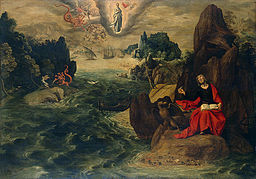 Pliny’s letter to Emperor Trajan also refers to people who claim that they were once Christians, but denied their faith in Christ as much as twenty years ago. As was the case in Pliny’s own time, at least some of these probably denied their faith under pressure to do so, including pressure from local officials, like Pliny. Therefore, Pliny provides at least some support for persecution of Christians in Asia Minor around A.D. 92 (112-20=92), which is around the time when John wrote Revelation (in A.D. 90-96). Even so, persecution of Christians in Asia Minor could have been going on for a long time, as even the book of Acts shows (19:23-41).
Pliny’s letter to Emperor Trajan also refers to people who claim that they were once Christians, but denied their faith in Christ as much as twenty years ago. As was the case in Pliny’s own time, at least some of these probably denied their faith under pressure to do so, including pressure from local officials, like Pliny. Therefore, Pliny provides at least some support for persecution of Christians in Asia Minor around A.D. 92 (112-20=92), which is around the time when John wrote Revelation (in A.D. 90-96). Even so, persecution of Christians in Asia Minor could have been going on for a long time, as even the book of Acts shows (19:23-41).
Here is the relevant quotation from Pliny’s letter to Emperor Trajan:
Pliny attests to the possibility that persecution of Christians is not a new thing: “Others named by the informer first said that they were Christians and then denied it; declaring that they had been but were so no longer, some having recanted three years or more before and one or two as long as twenty years. They all worshipped your image and the statues of the gods and cursed Christ.”
Sources:
1. Paul Hoskins, The Book of Revelation: A Theological and Exegetical Commentary, pp. 23 and 85 (See sources used on those pages, including Hemer’s Letters to the Seven Churches of Asia in their Local Setting [p. 10] and Martin Kiddle’s commentary on Revelation [p. xl]).
2. Robert L. Wilken, The Christians as the Romans Saw Them (2nd edition; New Haven: Yale University Press, 2003), 1-30 (chapter 1).
3. Henry Bettenson, Documents of the Christian Church (2nd edition; Oxford: Oxford University Press, 1963), 3-4 (source for Pliny’s letter and Trajan’s response).
Wilken’s book provides a number of examples of Roman views of the early Christians.
